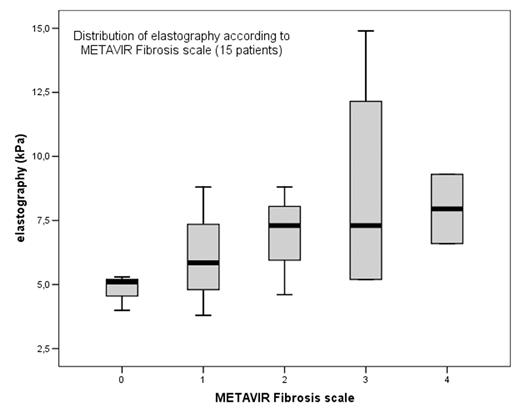Abstract
Background: The prognosis of liver iron overload is highly dependent on liver iron content (LIC) and the extent of liver fibrosis. Liver biopsy is the invasive reference method for fibrosis evaluation but with several limitations. Non-invasive biological methods (FibroTest, APRI) are not applicable in blood diseases. Transient elastography (TE) is a new non-invasive and rapid bedside method used to measure liver stiffness.This technique has been extensively studied with success in evaluation of liver fibrosis in HCV infection (Ziol, Hepatology 2005; Castera, Gastroenterology 2005). Until now, no data are available on evaluation of liver fibrosis by TE in highly transfused patients with iron overload.
Methods: We assessed liver stiffness (kPa) by elastography measurement (Fibroscan; Echosens, Paris, France). Ishak’s and Metavir’s scales were used to stage fibrosis and hepatitis activity; LIC was measured by atomic absorption spectometry in a central laboratory (Rennes, France) and by MRI procedure according to Gandon (Lancet 2004). Cardiac MRI T2* (indirect estimation of iron heart content) was also measured by MRI according to Anderson (Eur Heart J 2001). Serum ferritin level and HCV serology were assayed in all cases. Correlation statistical analysis used Spearman’s Rho and Pearson tests and mean comparisons were done by a non-parametric Mann-Whitney test.
Results: 15 liver samples (weight >1mg except 1) from monthly transfused patients (13 major beta Thalassemia, 1 sickle cell disease, 1 myelodysplastic syndrome) were analyzed. Median age was 37 years (7–75). Histological results were: 3 cirrhosis (METAVIR F=4 (F4), or Ishak’s Staging =6 (IS6)) among 5 patients with severe fibrosis (F3,F4) or (IS4-6) and 10 patients with no or mild fibrosis (F0-2) or (IS0-3). Mean ferritin was 2579 ng/ml CI 95% [1372–3786]. 2 patients were HCV positive. Correlation between LIC and ferritin was 0.82 (p<0,05); between LIC and MRI LIC: 0.88 (p<0,05); LIC and MRI Heart T2*: 0.72(p<0,05); METAVIR F score and Ishak’s grading score: 0.86 (p<0,05). A correlation was also observed between METAVIR F and elastography: 0.60(p<0,05); and mean values of elastography were significally different in patients with severe fibrosis: 9.1kPa CI95% [4.5–13.7] vs 5.9kPa CI95% [4.6–7.2] in those without sever fibrosis (p<0,05) (fig). A value of elastography above 6.25kPa (Se=80%; Sp=70%; AUROC=0.820) identified patients at risk for severe fibrosis (F3,F4 or IS 4–6) (Negative Predictive Value = 88%; Positive Predictive Value = 57%).
Conclusion: A significant correlation between Metavir Fibrosis scale and elastography values was found. This new non-invasive method would be helpful to evaluate liver fibrosis and to determine patients who could avoid invasive procedures in particular in regularly transfused low risk myelodysplastic patients at risk of bleeding due to abnormal platelet function. These preliminary results will have to be confirmed in a larger population.
Disclosure: No relevant conflicts of interest to declare.
Author notes
Corresponding author


